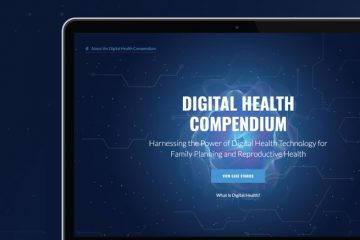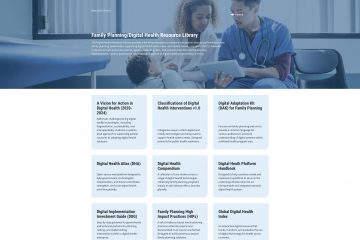Digital Health Compendium
Explore case studies across a range of digital health technologies.

Explore PRB and PACE’s work at the intersection of digital health technologies and family planning programming.
December 7, 2021

Explore case studies across a range of digital health technologies.

A list of resources for family planning stakeholders supporting digital health tools in low- and middle-income countries.
Digital health is an umbrella term that encompasses an array of information and communications technologies used in health care, including mobile health (mHealth), telehealth/telemedicine, eHealth, health information technology (IT), health management information systems, use of blockchain technology, and artificial intelligence. These digital health technologies can support individuals, health providers, and health systems managers to make informed decisions and engage individuals to improve demand, access, coverage, quality, and affordability of health care for everyone.
As low- and middle-income countries transition from paper to digital systems, family planning programs can benefit from unprecedented opportunities to improve services. Investments in digital health tools have expanded exponentially, but information on what works—and what does not— remains limited and scattered. As investments have increased, digital applications and data fragmentation have proliferated, but stakeholders are moving toward more coordinated efforts to scale digital health solutions, support countries’ digital health infrastructure, and share evidence-based learnings.
The interactive Digital Health Compendium, launched by PACE in 2020, features case studies across a range of digital health technologies used to enhance the impact and efficiency of family planning programs. In 2021, PACE transitioned leadership of the Compendium to The Medical Concierge Group (TMCG), a digital health and telemedicine company based in Uganda.
This Digital Health Compendium enables users to explore case studies across a range of digital health technologies used to enhance family planning programs mainly in sub-Saharan Africa, but also in other regions of the world. Digital health applications in family planning programs can be broadly classified as those affecting demand generation, service delivery, supply chain management, and the policy and enabling environment. In many low- and middle-income countries, digital health innovations were adopted earlier in other health sectors, including HIV/AIDS, maternal and child health, and noncommunicable disease prevention and response. As a result, much of the impact evidence is restricted to those sectors. To advance greater adoption of digital technology in family planning programs, more data and information on the challenges, opportunities, scalability, and results are needed. This compendium aims to consolidate emerging information and data on applications of digital technology in family planning programs to inform adoption and scale-up of successful approaches.
PRB alongside The Medical Concierge Group, Knowledge Success, and Maternal & Infant Health Consulting hosted a webinar during Transform Digital Health Week 2021 titled “Designing or Implementing a Family Planning Program? How To Introduce Digital Solutions Sustainably and at Scale.” Four projects featured in the Digital Health Compendium highlighted trusted and innovative lessons on scaling and sustaining family planning and reproductive health initiatives through leveraging digital health solutions. The panel of national and international experts discussed broader implementation topics including involvement of government counterparts, partnerships, and revenue models. Technology-specific lessons included adaptability, integration, flexibility, and uptake. Recordings available below.
